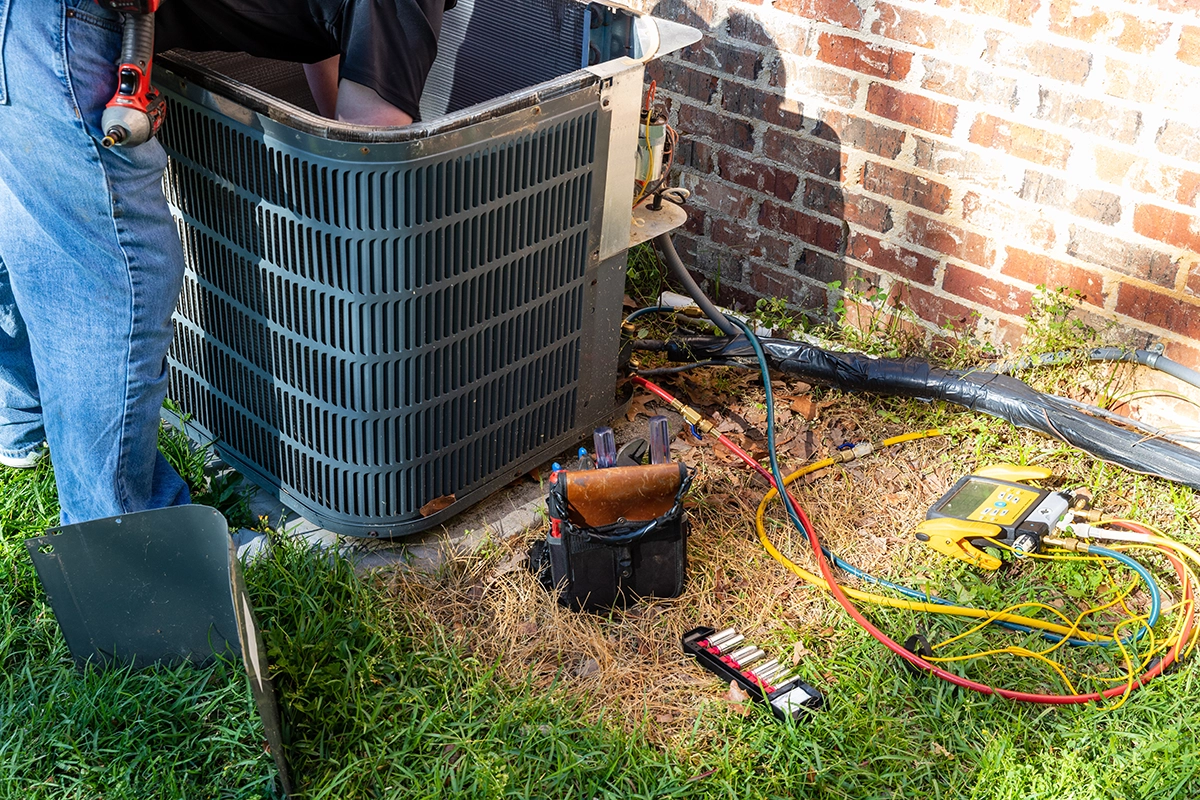If you’ve been told you have a Freon AC, or you’ve seen it on a service invoice, you might be wondering what it actually means—and whether you need to be concerned. At Good Hope Air Conditioning & Heating, we’ve worked on hundreds of Freon-based systems. So, if you’re not sure what Freon is, how it impacts your system, or what to do next, we’re here to help break it down in plain terms.
What Does “Freon AC” Actually Mean?
A Freon AC refers to an air conditioner that uses R-22 refrigerant, which was commonly branded as “Freon” for decades. While Freon is a trade name (like Kleenex for tissues), most homeowners use it to refer to R-22—an older refrigerant type used in central air systems manufactured before 2010.
Is Freon Still Being Used in AC Systems?
Not anymore—not legally, at least in new systems. The U.S. Environmental Protection Agency (EPA) began phasing out R-22 in 2010 due to its ozone-depleting properties. As of January 1, 2020, it’s no longer produced or imported in the U.S. That means existing Freon must be reclaimed and recycled. You can read more about the phaseout on the EPA’s official R-22 phaseout page.
So if you have a Freon AC, it’s still legal to run it—but it’s becoming harder and more expensive to service.
Signs You Might Have a Freon AC System
Not sure what kind of refrigerant your system uses? Here are a few clues:
-
The system was manufactured before 2010
-
The nameplate lists “R-22” or “HCFC-22”
-
Your HVAC tech mentioned Freon or older refrigerant
-
Your AC repair quote includes high refrigerant costs
If you’re still unsure, a licensed HVAC technician can check your system during a maintenance visit. At Good Hope Air Conditioning & Heating, we include refrigerant identification in every inspection.
Can Freon AC Systems Be Repaired?
Repairs Are Still Possible—For Now
Although the Freon AC phaseout is in full swing, many systems still function. Technicians can recharge them using reclaimed R-22, but it’s more expensive and harder to find. That means future repairs could cost more than a replacement.
If your system is leaking or struggling to cool, it might be time to consider an upgrade. In many cases, newer systems offer better efficiency, lower energy bills, and longer warranties.
Freon AC vs New Refrigerant Options
Today’s AC systems use refrigerants like R-410A or the newer R-454B, which are more environmentally friendly and efficient. Unlike Freon, these refrigerants don’t deplete the ozone layer.
If you’re replacing a Freon AC, you’ll need a full system changeout—not just a new refrigerant. That’s because older components aren’t compatible with the newer refrigerants. But the good news is, the long-term savings in efficiency and reliability often make the switch worthwhile. Learn more about certified high-efficiency cooling systems on the Energy Star central air conditioners page.
How Older AC Systems Stack Up in Efficiency
It’s worth noting that even a well-maintained Freon AC may not be as efficient as modern alternatives. Older units tend to have lower SEER ratings, and their parts degrade over time. This leads to longer run times, higher electric bills, and more frequent breakdowns.
What’s the Cost of Keeping a Freon AC?
There’s no one-size-fits-all answer. However, keep these costs in mind:
-
Freon refills (if needed) can be $100–$600 per pound
-
Parts for older systems may be hard to find
-
Emergency repairs tend to cost more
-
Energy bills are usually higher with aging units
While your Freon AC might still run, it’s smart to prepare for what comes next. If you’re unsure, Good Hope Air Conditioning & Heating offers affordable inspections and honest upgrade advice.
Should You Replace Your Freon AC?
If your system is still working and you’re not having cooling issues, there’s no rush. But if you’re seeing signs of inefficiency, rising repair bills, or reduced comfort, it’s worth exploring your options.
The U.S. Department of Energy offers tips on how to choose the right air conditioner for your home. Many manufacturers now offer rebates or financing to help homeowners replace outdated systems. Plus, at Good Hope Air Conditioning & Heating, we offer financing options to make the upgrade more manageable.
Final Thoughts
In summary, a Freon AC refers to any air conditioner that uses R-22 refrigerant. While these systems aren’t banned, maintaining them is getting more expensive, and you can’t refill them with new Freon anymore. If you’re considering an upgrade, it’s best to act sooner rather than wait—before the system fails and leaves you without cooling in the peak of summer.
At Good Hope Air Conditioning & Heating, we’re proud to help homeowners in Riverside, CA and the surrounding communities make smart, cost-effective choices. If you have a Freon AC system and aren’t sure what to do next, we’ll walk you through your options with honest advice and dependable service. Contact us today to schedule your inspection or upgrade consultation.



